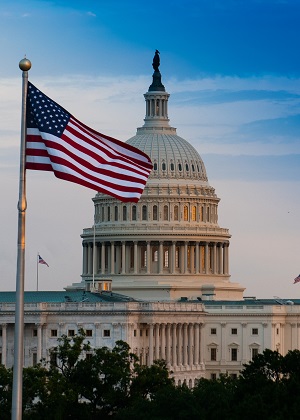Newsroom
Elevate your advocacy with new issue briefs
 As credit unions gear up for NAFCU's Virtual Congressional Caucus – less than a week away – and the 2020 presidential election, the association has developed new, in-depth issue briefs on key industry issues to bolster advocacy efforts. The briefs cover coronavirus pandemic relief priorities, Bank Secrecy Act (BSA)/anti-money laundering (AML) regime reforms, defense credit union issues, and the credit union difference.
As credit unions gear up for NAFCU's Virtual Congressional Caucus – less than a week away – and the 2020 presidential election, the association has developed new, in-depth issue briefs on key industry issues to bolster advocacy efforts. The briefs cover coronavirus pandemic relief priorities, Bank Secrecy Act (BSA)/anti-money laundering (AML) regime reforms, defense credit union issues, and the credit union difference.
NAFCU's annual Caucus is a premier event that allows credit unions to hear directly from lawmakers, administration officials, and regulators on what's happening in Washington. It also gives industry leaders the opportunity to hold Capitol Hill meetings to discuss how policies are impacting their operations and communities. The issue briefs – found on the Hill meeting request page – are great resources that break down complex issues in an easy-to-digest format.
Pandemic Relief
Many Americans are facing significant financial hardships in the wake of the coronavirus pandemic and credit unions have stepped up to help protect their members' financial health. The issue brief outlines legislative developments and the priorities NAFCU would like addressed to provide credit unions with even more flexibility and relief to serve members, including providing relief under the member business lending (MBL) cap, extending Central Liquidity Facility (CLF) and troubled debt restructuring (TDR) provisions, providing more funding for programs to help credit unions serve underserved communities, and more. It also highlights some proposed provisions that could make it harder for members to access credit or recover.
BSA/AML Reforms
BSA/AML reform is one of the association's advocacy priorities for 2020. NAFCU continues to urge Congress to support bipartisan solutions to strengthen and improve the BSA/AML system. This issue brief details various bills that would ease credit unions' BSA/AML compliance burdens and improve the system. NAFCU is currently calling on Congress to include certain BSA/AML reforms in the fiscal year 2021 National Defense Authorization Act (NDAA).
Defense Credit Union Issues
Credit unions play a key role in providing safe, affordable financial products and services to the nation's servicemembers and their families. NAFCU works closely with the Defense Credit Union Council (DCUC) to ensure laws and regulations allow credit unions to effectively serve military members. The issue brief focuses on efforts to oppose a bank-sought provision in the NDAA, which could disadvantage credit unions as it would treat all banks, including large ones like Wells Fargo, the same as local, not-for-profit credit unions when it comes to nominal leases on military bases. The Senate-passed version of the FY2021 NDAA included this NAFCU-opposed provision, but the association's advocacy kept it out of the House-passed version. Congress is expected to soon form a conference committee to hash out differences between the two bills and NAFCU will continue to fight to ensure the nominal lease provision is not included in final legislation.
Credit Union Difference
NAFCU consistently touts the difference between credit unions and banks – primarily that the industry is focused solely on serving members' best interests rather than seeking profits. This issue brief highlights the diversity of credit unions compared to banks, the industry's support of small businesses, and more. In addition, NAFCU President and CEO Dan Berger recently outlined the credit union difference to the campaigns of Republican presidential candidate Donald Trump and Democratic presidential candidate Joe Biden, and the association has highlighted credit unions' service to members amid the coronavirus pandemic. NAFCU also fights back against meritless attacks from bankers and other groups, most recently defending the credit union industry's tax-exempt status and calls for MBL relief.
NAFCU's 2020 Congressional Caucus will be held entirely virtually Sept. 14-15; leaders from the CFPB, NCUA, Federal Housing Finance Agency (FHFA), Small Business Administration (SBA) and the Senate Banking Committee are set to address attendees.
View the full agenda and register for Virtual Congressional Caucus now.
Share This
Related Resources
NCUA Supervisory Priorities for 2018
Articles
Get daily updates.
Subscribe to NAFCU today.
